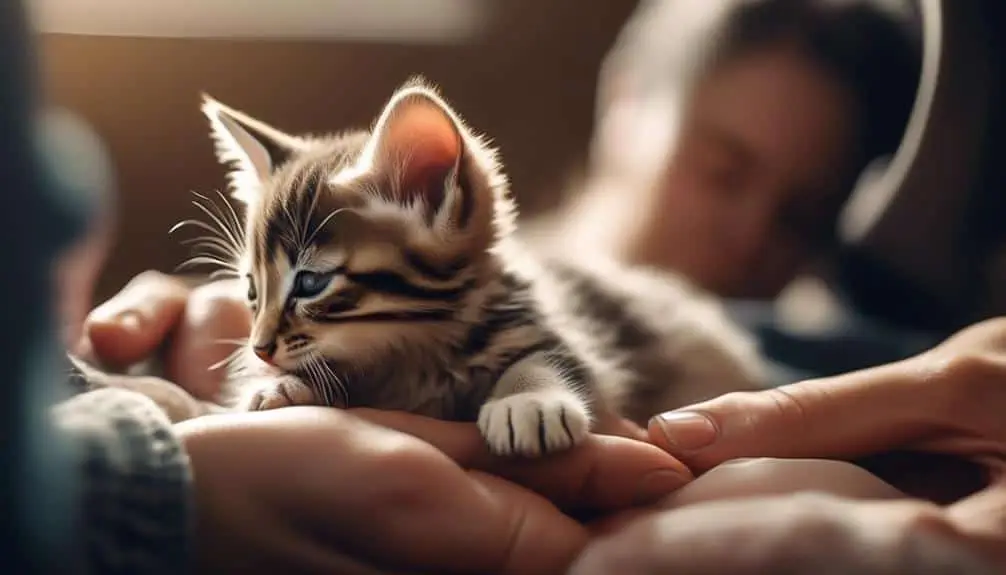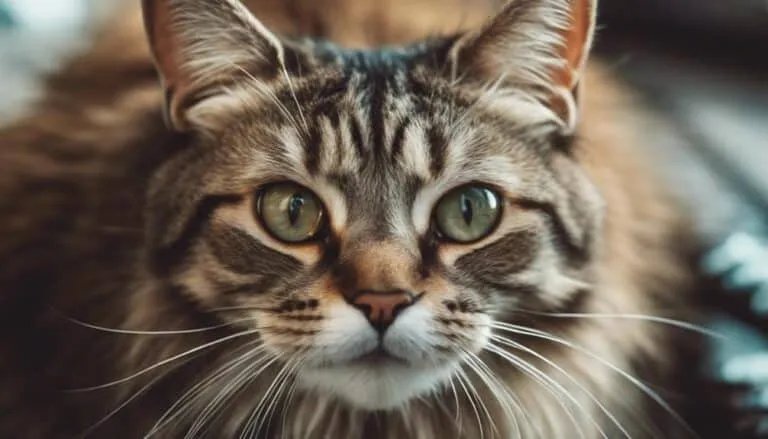The Best Fluffy Pancakes recipe you will fall in love with. Full of tips and tricks to help you make the best pancakes.

In the world of animal care, ailing kittens are in desperate need of specialized techniques to save their lives. Fading kitten syndrome, a condition that threatens the well-being of these vulnerable creatures, requires immediate attention and knowledge.
This article presents expert tips on life-saving techniques for ailing kittens, delving into the essential supplies needed and the warning signs to watch out for.
It also emphasizes the critical role of veterinary care and explores preventive measures to safeguard the health of newborn kittens.
By harnessing the power of responsible breeding practices and timely intervention, we can significantly improve the chances of survival for these delicate creatures.
Stay tuned to discover the invaluable knowledge that can support ailing kittens during their most critical moments.
Key Takeaways
- Recognizing warning signs of fading kitten syndrome, such as weakness and lack of appetite, is crucial for early intervention and saving ailing kittens.
- Providing warmth and increasing blood sugar levels are vital steps in helping a sick kitten. Using blankets, heating pads, and Karo syrup can help stabilize their condition.
- Seeking immediate veterinary care is essential for dying kittens. Professionals can provide necessary medical intervention and determine the underlying cause of the kitten's health decline.
- Factors such as larger litters, nutritional deficiencies, and maternal neglect can contribute to fading kitten syndrome. Taking preventive measures, such as responsible breeding and providing a safe environment, can improve newborn kittens' chances of survival.
Warning Signs of Fading Kitten Syndrome
Recognizing the warning signs of fading kitten syndrome is crucial in identifying and addressing the declining health of newborn kittens. One of the key signs to look out for is maternal neglect in kittens. Maternal neglect can manifest as the mother rejecting certain kittens in the litter or refusing to feed them, leading to malnutrition and weakness.
Other signs of fading kitten syndrome include weakness, lethargy, low body temperature, inability to gain weight, and lack of appetite. By being vigilant and observant, caregivers can intervene early and prevent fading kitten syndrome.
Providing supplemental feeding, ensuring warmth, and seeking veterinary care immediately are essential steps in preventing the worsening of this condition. It is important to act swiftly and compassionately to give these vulnerable kittens the best chance at survival.
Essential Supplies for Saving Kittens
What are the essential supplies needed for saving ailing kittens?
When it comes to caring for sick or ailing kittens, having the right supplies on hand is crucial. These supplies can help provide the necessary warmth, nutrition, and comfort that these vulnerable creatures need.
Some of the supplies for kitten care include:
- A heating pad or hot water bottle to regulate their body temperature
- Karo syrup or sugar water to increase their blood sugar levels
- Blankets to keep them warm
- A box or crate for a safe and secure environment
Additionally, a nursing kit may also be necessary to feed them if they are unable to nurse from their mother.
These supplies, along with proper techniques for saving kittens, can make a significant difference in their overall well-being and chances of survival.
Providing Warmth for Sick Kittens
When it comes to the well-being of sick or ailing kittens, one crucial aspect that requires immediate attention is providing them with the necessary warmth for their recovery. Sick kittens are often weak and may struggle to maintain their body temperature, which can impede their healing process.
To provide comfort and nurture sick kittens, here are three essential techniques for providing warmth:
- Wrapping in a warm blanket or towel: Placing a sick kitten in a soft, warm blanket or towel can help regulate their body temperature and provide a sense of security.
- Using a heating pad or hot water bottle (with caution): Placing a heating pad or hot water bottle near the kitten's nesting area can help provide a consistent source of warmth. However, it is important to ensure the heating pad or hot water bottle is not in direct contact with the kitten's delicate skin to prevent burns.
- Using uncooked rice in a sock: An alternative method for providing warmth is by filling a sock with uncooked rice, tying it off, and heating it in the microwave for a short time. This rice sock can then be placed near the kitten to provide gentle warmth.
Increasing Blood Sugar Levels in Kittens
To ensure the well-being of ailing kittens, it is crucial to take measures to increase their blood sugar levels. Managing dehydration in kittens is essential as it can lead to low blood sugar levels. One effective method is to apply Karo corn syrup directly to the kitten's gums every 3 minutes. If Karo syrup is not available, pancake syrup or sugar mixed with warm water can be used as an alternative.
By administering the syrup and cradling the kitten, improvement in blood sugar levels can be observed within 20 minutes if low blood sugar is the cause. Additionally, it is important to identify common bacterial infections in kittens, as these can also contribute to low blood sugar levels.
Seeking veterinary care immediately is crucial for proper diagnosis and treatment to ensure the kitten's well-being.
Importance of Veterinary Care for Ailing Kittens
Seeking immediate veterinary care is crucial for ailing kittens, as it can make a significant difference in their chances of survival and overall well-being. Veterinary intervention benefits ailing kittens in several ways:
- Early intervention: Timely veterinary care ensures that any underlying medical conditions or illnesses are identified and treated promptly. Kittens are more vulnerable to infections and diseases due to their weak immune systems, and early intervention can prevent these conditions from worsening.
- Expert diagnosis and treatment: Veterinarians have the knowledge and expertise to accurately diagnose the cause of a kitten's ailment and provide the appropriate treatment. They can administer necessary medications, perform necessary procedures, and offer supportive care to stabilize the kitten's condition.
- Preventing complications: Ailing kittens are at a higher risk of developing complications, such as dehydration, malnutrition, and organ failure. Veterinary care can help prevent these complications by providing the necessary fluids, nutrition, and supportive therapies.
Importance of early intervention cannot be stressed enough when it comes to ailing kittens. Seeking veterinary care promptly can increase their chances of survival and improve their overall quality of life.
Causes of Fading Kitten Syndrome
Fading Kitten Syndrome, a condition that tragically affects newborn kittens, can be caused by a variety of factors that contribute to their declining health and survival.
One such factor is the effects of stress on kitten health. Kittens that are exposed to high levels of stress, such as overcrowding or traumatic births, are more susceptible to developing fading kitten syndrome.
Additionally, the impact of maternal neglect on litter health can also play a role. When a mother cat neglects certain kittens in the litter, they may experience malnutrition due to not receiving adequate nursing or the mother's refusal to feed them. This can weaken their immune system and make them more vulnerable to fading kitten syndrome.
It is important to address these factors and provide the necessary care and attention to ensure the health and survival of newborn kittens.
Factors Affecting Newborn Kittens' Survival
Factors that play a crucial role in the survival of newborn kittens include their birth weight, ability to maintain proper blood sugar levels, and the presence of maternal antibodies to protect against infections.
- Birth weight: Newborn kittens with low birth weight are more vulnerable to health issues and have a higher mortality rate. Adequate nutrition and care are essential to ensure healthy growth and development.
- Blood sugar levels: Hypoglycemia, or low blood sugar, can lead to weakness and lethargy in kittens. It is important to monitor their blood sugar levels and provide appropriate nutrition to prevent complications.
- Maternal antibodies: Maternal neglect can result in the rejection of certain kittens in the litter, depriving them of vital maternal antibodies. These antibodies provide protection against infections and play a crucial role in the survival of newborn kittens.
Understanding these factors affecting kitten mortality and the impact of maternal neglect is vital in ensuring the well-being and survival of newborn kittens. By addressing these factors and providing appropriate care, we can improve their chances of survival and promote their overall health and well-being.
Common Causes of Neonatal Kitten Deaths
Understanding the factors that contribute to the mortality of newborn kittens is crucial for ensuring their well-being and implementing appropriate measures to prevent any unfortunate outcomes.
One common cause of neonatal kitten deaths is fading kitten syndrome. This syndrome refers to the gradual decline and eventual death of a seemingly healthy newborn kitten. It is often characterized by weakness, lethargy, low body temperature, inability to gain weight, and lack of appetite.
Preventing fading kitten syndrome requires improving maternal care. Maternal neglect, resulting in the rejection of certain kittens in the litter, can lead to malnutrition as weaker kittens may not receive adequate nursing or the mother may refuse to feed them. Traumatic births or post-birth trauma can also contribute to fading kitten syndrome.
Strategies to Support Newborn Kittens' Survival
Implementing effective strategies is crucial for supporting the survival of newborn kittens and ensuring their well-being during this vulnerable stage of life. To prevent fading kitten syndrome and promote healthy growth in kittens, the following strategies can be implemented:
- Adequate nutrition: Providing a balanced and nutritious diet is essential for the healthy development of newborn kittens. Feeding them with a high-quality kitten formula or ensuring they receive enough colostrum from their mother can help prevent malnutrition and support their immune system.
- Maintaining a warm environment: Newborn kittens are unable to regulate their body temperature effectively, making them susceptible to hypothermia. Keeping them in a warm and cozy environment, using heating pads or hot water bottles (with caution to avoid direct contact), and providing blankets can help maintain their body temperature and prevent complications.
- Regular veterinary check-ups: Seeking regular veterinary care for newborn kittens is crucial. This includes vaccinations, deworming, and monitoring their growth and development. Prompt identification and treatment of any health issues can significantly improve their chances of survival.
Preventive Measures for Newborn Kitten Health
To ensure the well-being and health of newborn kittens, it is crucial to take proactive measures that promote their overall health and prevent potential health issues.
Responsible breeding practices play a significant role in ensuring the health of newborn kittens. Breeders should prioritize the health and well-being of the mother cat, ensuring she is in optimal condition before breeding. Neglect from the mother cat can have a detrimental impact on the health of the kittens. Maternal neglect can lead to the rejection of certain kittens in the litter, resulting in malnutrition and weakening of these kittens.
To prevent such issues, it is important to provide a safe and clean living environment for the mother cat and her kittens. Regular veterinary care, including vaccinations and deworming, is also essential in maintaining the health of newborn kittens.
Conclusion
In conclusion, the well-being and survival of ailing kittens require immediate attention and specialized care. By recognizing warning signs, providing essential supplies, and seeking veterinary care, we can increase their chances of recovery.
It is crucial to address the underlying causes of fading kitten syndrome, such as nutritional deficiencies and overcrowding, and implement preventive measures to safeguard their health.
Through responsible breeding practices and timely intervention, we can support these vulnerable creatures during their most critical moments and improve their overall survival rates.








